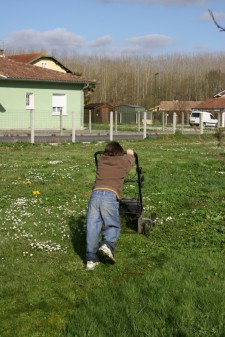Courageous kids, not cocky

Part 3 of the Encouraging Your Child series by Kathy Kuhl, adapted from her coming book, Encouraging Your Child.
In my last two posts of this series, I discussed what to praise: effort, perseverance, success (large and small), and progress. Today, let’s look at how to praise our children more effectively.
Praise Specifically

It is easy to be specific when you correct a child. “Go back and clear your place.” “No texting at the table.” “You didn’t finish the back of the worksheet.” But so often our praise is vague.
If Mom or Dad point out three specific ways her son fell short while mowing the lawn—“You forgot to mow behind the garden,” “You missed a strip,” “You didn’t sweep the walk”—then a vague “Good job” afterward isn’t going to be as believable. Specific praise is credible: “Thanks for remembering to put away all the tools,” “You took all those corrections well,” or “The yard looks so much neater now.”
Whatever the task, look for something specific to praise. After weeks of correction, did your son made his bed without your having to call him back? Maybe your daughter’s essay shows an unusual insight or a well-turned phrase. Your creative thinker may find an opportunity to be helpful that others overlooked.
Did you notice and say something to encourage this? My father had a small plaque at work that said, “When you’re right, no one remembers. When you’re wrong, no one forgets.” Aim to be the parent who remembers the successes, and doesn’t dwell on the failures.
There is always something to praise. Did your son knock the mud off his soccer kleats without being reminded? Did your daughter put away her book? Was his paragraph staying inside the margins for a change? Catch them doing good.
Praise briefly
While praise should be specific, it doesn’t need to be wordy. Sometimes saying “Good” or “Nice work” is a sufficient response to a particular action, such as your child remembering to take out the trash. Like overblown praise, overextended praise causes the child to tune out: “Oh, my parents like to go on and on.”
We can praise specifically and concisely: “I’ve noticed you’ve been spelling February correctly lately. Good for you!” “You hung up your jacket without being reminded.” “You remembered to say ‘thank you’ the store clerk.” “Neat handwriting—your capital S is perfect!”
Praise sooner, not later
Anyone with a toddler knows there is no point complimenting or disciplining them for what they did last week. When it comes to shaping our older children’s behavior, we must not wait long to praise them, either.
But we should praise our kids when they can listen. I’m all for standing on the sidelines at a game and cheering whether they hear me or not. But when I want to compliment a child on his or her behavior, I need to pick a time when they are not distracted. If I wait until when I can look them in the eye, and have their attention, my words can do more good. Close to the event is good, or at bedtime, when the child is quieted by a bedtime routine, and ready to savor your praise, and benefit from your (brief!) insights.
More Praise than Criticism
Yes, I wrote that, but for me it’s a goal, rather than an accomplishment. If you are a recovering perfectionist like me, consider this. Too much correction with a critical tone not only discourages your child, it makes it harder for them to listen to your excellent advice. I’ll say more about this next time.
How you praise matters. When you praise your child, what have you done that makes your praise more effective? Please answer in the comment section below.
Adapted from Kathy Kuhl’s upcoming book, Encouraging Your Child.


One Comment